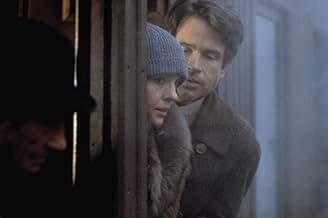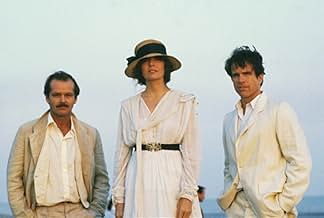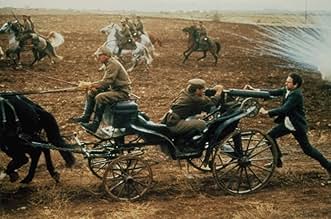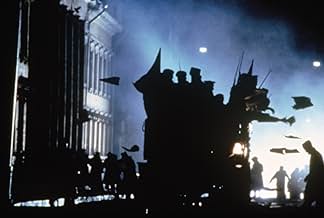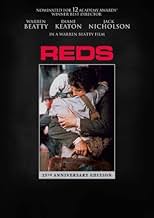PUNTUACIÓN EN IMDb
7,3/10
26 mil
TU PUNTUACIÓN
Un periodista estadounidense radical se involucra con la revolución comunista en Rusia y espera llevar su espíritu e idealismo a los Estados Unidos.Un periodista estadounidense radical se involucra con la revolución comunista en Rusia y espera llevar su espíritu e idealismo a los Estados Unidos.Un periodista estadounidense radical se involucra con la revolución comunista en Rusia y espera llevar su espíritu e idealismo a los Estados Unidos.
- Dirección
- Guión
- Reparto principal
- Ganó 3 premios Óscar
- 22 premios y 37 nominaciones en total
Eleanor Wilson
- Mrs. Reed
- (as Eleanor D. Wilson)
Reseñas destacadas
This movie was great, and I hope it comes out on DVD real soon. Beatty became Reed in more than one sense--not only did he act the part, but he directed the movie in a way reminiscent of the kind of "new journalistic" style that Reed and his fellow MASSES writers pioneered, mixing the drama with interviews of people who knew JR, Louise, etc.
The film also sort of puts forward the question, "What if, instead of running back to Russia (to die of kidney failure and mistreatment by the CP), Jack Reed had stayed in this country to build the CP? Would it have turned out to become Stalinist?" According to Howe and Coser, who wrote a good book on THE AMERICAN COMMUNIST PARTY, much like Rosa Luxemburg and Karl Liebknecht in Germany, Reed was the ONLY leader who was independent, who had some real backbone.
The best part of the movie is when Emma Goldmann, played by Maureen Stapleton, tells Jack that "it doesn't work" (i.e. statist, bureaucratic socialism that the Bolsheviks were instituting as a grossly mistaken response to the economic crisis and Allied invasion of Russia after the Revolution). And then his rebellion against the lying propaganda of Zinoviev. Kind of hits me right now that Jerzy Kosinski should play Zinoviev--didn't he commit suicide when he was exposed as a plagiarist? Where is the line between art and reality, politics and life?
Of course I loved the romantic reality between Beatty, Bryant, and Nicholson (Reed, Bryant, and Eugene O'Neill). And the cynicism that Reed expresses about the Democrats and Wilson is certainly apropos today.
The film also sort of puts forward the question, "What if, instead of running back to Russia (to die of kidney failure and mistreatment by the CP), Jack Reed had stayed in this country to build the CP? Would it have turned out to become Stalinist?" According to Howe and Coser, who wrote a good book on THE AMERICAN COMMUNIST PARTY, much like Rosa Luxemburg and Karl Liebknecht in Germany, Reed was the ONLY leader who was independent, who had some real backbone.
The best part of the movie is when Emma Goldmann, played by Maureen Stapleton, tells Jack that "it doesn't work" (i.e. statist, bureaucratic socialism that the Bolsheviks were instituting as a grossly mistaken response to the economic crisis and Allied invasion of Russia after the Revolution). And then his rebellion against the lying propaganda of Zinoviev. Kind of hits me right now that Jerzy Kosinski should play Zinoviev--didn't he commit suicide when he was exposed as a plagiarist? Where is the line between art and reality, politics and life?
Of course I loved the romantic reality between Beatty, Bryant, and Nicholson (Reed, Bryant, and Eugene O'Neill). And the cynicism that Reed expresses about the Democrats and Wilson is certainly apropos today.
.
I am old enough to have lived through (probably) three different Americas. These are radically different worlds. It isn't just the mood, styles or state of the economy; its the adoption of a whole cosmology. Religions change under our feet. Family, love, belonging. These things are malleable yet largely beyond our control and we forget what "things were like." Memory always is constructed in terms of the present world.
Always.
So projects like this are necessary. We cannot know who we are unless we remind ourselves who we were.
The ordinary fold here is a romance, folded into grand political actions. Here they are a bit more cerebral than usual, but never getting past the notion of simple justice.
The more unusual and complex fold is that we see a story based on real events and people. Interspersed with that story are interviews of people who were personally involved in the story. These are remarkable, the way they are captured and the way they are edited to overlap with and annotate the story. But much more engaging is that these are enticing people, many with minds and phases that invite us into their faces made warmer and more open by Beatty's camera. I compare this to the "Up" serious and the contrast is astonishing. True, here we want to be informed about the lives of others, and the "Up" goals pretend that the people randomly selected decades ago are remotely worth knowing.
But these folks are. We want more, simply based on their implicit invitation, and we carry ourselves into the narrative more forcefully, sort of like the characters do. This is folding doing its job and doing it well. They remember. I remember, and therefore am.
Ted's Evaluation -- 3 of 3: Worth watching.
I am old enough to have lived through (probably) three different Americas. These are radically different worlds. It isn't just the mood, styles or state of the economy; its the adoption of a whole cosmology. Religions change under our feet. Family, love, belonging. These things are malleable yet largely beyond our control and we forget what "things were like." Memory always is constructed in terms of the present world.
Always.
So projects like this are necessary. We cannot know who we are unless we remind ourselves who we were.
The ordinary fold here is a romance, folded into grand political actions. Here they are a bit more cerebral than usual, but never getting past the notion of simple justice.
The more unusual and complex fold is that we see a story based on real events and people. Interspersed with that story are interviews of people who were personally involved in the story. These are remarkable, the way they are captured and the way they are edited to overlap with and annotate the story. But much more engaging is that these are enticing people, many with minds and phases that invite us into their faces made warmer and more open by Beatty's camera. I compare this to the "Up" serious and the contrast is astonishing. True, here we want to be informed about the lives of others, and the "Up" goals pretend that the people randomly selected decades ago are remotely worth knowing.
But these folks are. We want more, simply based on their implicit invitation, and we carry ourselves into the narrative more forcefully, sort of like the characters do. This is folding doing its job and doing it well. They remember. I remember, and therefore am.
Ted's Evaluation -- 3 of 3: Worth watching.
Bolshevik leader V.I. Lenin once wrote, "The capitalists will sell us the rope with which we will hang them."
Lenin's quote came to mind when I was watching one of the most spellbinding movies to come along in years,and not since David Lean's brilliant 1965 epic classic "Doctor Zhivago" hasn't been a movie in recent memory that has come close. That motion picture is "Reds",released in 1981 by Paramount Pictures. The film was Warren Beatty's peeve project which he served not only as it star,but also the co-writer and direction. Director Warren Beatty's epic love story about American writers John Reed and Louise Bryant,set amid of the turbulence of American politics in the 1910's World War I and the Russian revolution that set this movie into plain focus. The movie itself is astounding to behold and is a tragic love story between the writers John Reed(Warren Beatty),and Louise Bryant(Diane Keaton). But it creatively used artsy,radical Greenwich Village in the 1910's-and such as real-life characters as playwright Eugene O'Neill(Jack Nicholson),and anarchist activist Emma Goldman(Maureen Stapleton)-as well as the drama of the Russian Revolution and the subsequent civil war as the principal landscapes in which their relationship plays out.
Director Beatty also made creative use of on-camera "testimony" by the likes of novelists Henry Miller and Rebecca West,Republican politician Hamilton Fish,comic George Jessel and civil libertarian Roger Baldwin. These senior citizens recall,with varying degrees of historical accuracy,Reed,Bryant and the times in which they lived. "Reds" shows convincingly that many of the contemporary issues in politics and culture have their antecendents in the first debates of the 20th century. Debates over birth control and abortion,marriage and commitment,public life versus private life,revolution versus reform are given full expression from varying viewpoints throughout the lengthy film(which runs over three hours). To Beatty's credit,his film captures the excitement the Bolshevik revolution stirred,both inside and outside Russia while revealing how the Bolshevik leadership quickly began to suppressing dissent within the revolutionary ranks on the way to becoming a dictatorship with a country that is in constant turmoil. Beatty's efforts certainly paid off artistically,bringing him prestige to him and Paramount making "Reds" a huge box office success for the studio when it premiered in theatres around Christmas of 1981.
"Reds" became one of the top highest grossing pictures of that year,and it paid off in high standards too. "Reds",which received 12 Academy Award nominations including Best Picture,lost an upset to Hugh Hudson's "Chariots Of Fire" in the Best Picture category. However it won three Oscars for Best Director(Warren Beatty),Best Supporting Actress(Maureen Stapleton),and Best Cimematopgraphy(Vittorio Storaro). Eventually,"Reds" made more than $40 million at the domestic box office,and once international figures were added in,it became one of the top grossing films of the 1980's. A feat Warren Beatty is still proud of to this day.
Lenin's quote came to mind when I was watching one of the most spellbinding movies to come along in years,and not since David Lean's brilliant 1965 epic classic "Doctor Zhivago" hasn't been a movie in recent memory that has come close. That motion picture is "Reds",released in 1981 by Paramount Pictures. The film was Warren Beatty's peeve project which he served not only as it star,but also the co-writer and direction. Director Warren Beatty's epic love story about American writers John Reed and Louise Bryant,set amid of the turbulence of American politics in the 1910's World War I and the Russian revolution that set this movie into plain focus. The movie itself is astounding to behold and is a tragic love story between the writers John Reed(Warren Beatty),and Louise Bryant(Diane Keaton). But it creatively used artsy,radical Greenwich Village in the 1910's-and such as real-life characters as playwright Eugene O'Neill(Jack Nicholson),and anarchist activist Emma Goldman(Maureen Stapleton)-as well as the drama of the Russian Revolution and the subsequent civil war as the principal landscapes in which their relationship plays out.
Director Beatty also made creative use of on-camera "testimony" by the likes of novelists Henry Miller and Rebecca West,Republican politician Hamilton Fish,comic George Jessel and civil libertarian Roger Baldwin. These senior citizens recall,with varying degrees of historical accuracy,Reed,Bryant and the times in which they lived. "Reds" shows convincingly that many of the contemporary issues in politics and culture have their antecendents in the first debates of the 20th century. Debates over birth control and abortion,marriage and commitment,public life versus private life,revolution versus reform are given full expression from varying viewpoints throughout the lengthy film(which runs over three hours). To Beatty's credit,his film captures the excitement the Bolshevik revolution stirred,both inside and outside Russia while revealing how the Bolshevik leadership quickly began to suppressing dissent within the revolutionary ranks on the way to becoming a dictatorship with a country that is in constant turmoil. Beatty's efforts certainly paid off artistically,bringing him prestige to him and Paramount making "Reds" a huge box office success for the studio when it premiered in theatres around Christmas of 1981.
"Reds" became one of the top highest grossing pictures of that year,and it paid off in high standards too. "Reds",which received 12 Academy Award nominations including Best Picture,lost an upset to Hugh Hudson's "Chariots Of Fire" in the Best Picture category. However it won three Oscars for Best Director(Warren Beatty),Best Supporting Actress(Maureen Stapleton),and Best Cimematopgraphy(Vittorio Storaro). Eventually,"Reds" made more than $40 million at the domestic box office,and once international figures were added in,it became one of the top grossing films of the 1980's. A feat Warren Beatty is still proud of to this day.
"Reds" is a 200-minute epic masterpiece which deals with left-wing American journalist John Reed (Warren Beatty in an Oscar-nominated performance) and his coverage of the Russian Revolution of the 1910s. Beatty's passion is what carries this ambitious film, which could have easily been a multi-million dollar disaster. His Oscar-winning direction, screenplay, and overall performance carry the film as far as it can possibly go. The top-flight performances by Diane Keaton, Jack Nicholson (both Oscar-nominated), and Maureen Stapleton (Oscar-winning) all add great depth to the performance. Paul Sorvino, Edward Herrmann, and Gene Hackman also make lasting impressions in supporting roles. Overall a great achievement all the way around. 5 stars out of 5.
An engrossing film about John Reed's love affair with Louise Bryant and his struggles in the midst of the Russian Revolution. There are great performances from Beatty, Keaton, Nicholson (excellent as Eugene O'Neill) and Stapelton in her Oscar winning performance as Emma Goldman. Beatty's precision and timing in the use of his camera in this picture is a superb achievement. There is a touch of David Lean in director Beatty in this film. The color, the editing, the sound. All of those important filmic elements are at play here in great form. Beatty won the Best Director Oscar, but lost the Best Picture award to Chariots of Fire.
¿Sabías que...?
- CuriosidadesReportedly, Warren Beatty reshot some scenes up to 35 times. Paul Sorvino said he did as many as 70 takes for one scene, and Maureen Stapleton said she did as many as 80 takes for another. Reportedly, of this, she famously once said to Warren Beatty, "Are you out of your fucking mind?" This earned her a round of applause from the crew.
- PifiasThe Finnish doctor tells Reed that his blood pressure is too high, but at that time, hypertension was not considered a problem by most doctors, who did not even consider treating it. Not until the mid-'40s did doctors begin to understand the dangers of high blood pressure.
- Citas
Eugene O'Neill: If you were mine, I wouldn't share you with anybody or anything. It'd be just you and me. We'd be the center of it all. I know it would feel a lot more like love than being left alone with your work.
- Créditos adicionalesAs the credits roll, additional interviews with the 'witnesses' play.
- Versiones alternativasThree seconds of horse falls were cut from the British version. The DVD supplements showing these shots are also cut in England.
- ConexionesFeatured in Sneak Previews: Rollover, Quartet, My Dinner with Andre, Reds (1981)
- Banda sonoraYou're a Grand Old Flag
Written by George M. Cohan
Selecciones populares
Inicia sesión para calificar y añadir a tu lista para recibir recomendaciones personalizadas
- How long is Reds?Con tecnología de Alexa
Detalles
Taquilla
- Presupuesto
- 32.000.000 US$ (estimación)
- Recaudación en Estados Unidos y Canadá
- 40.382.659 US$
- Fin de semana de estreno en EE. UU. y Canadá
- 2.325.029 US$
- 6 dic 1981
- Recaudación en todo el mundo
- 40.382.788 US$
Contribuir a esta página
Sugerir un cambio o añadir el contenido que falta


